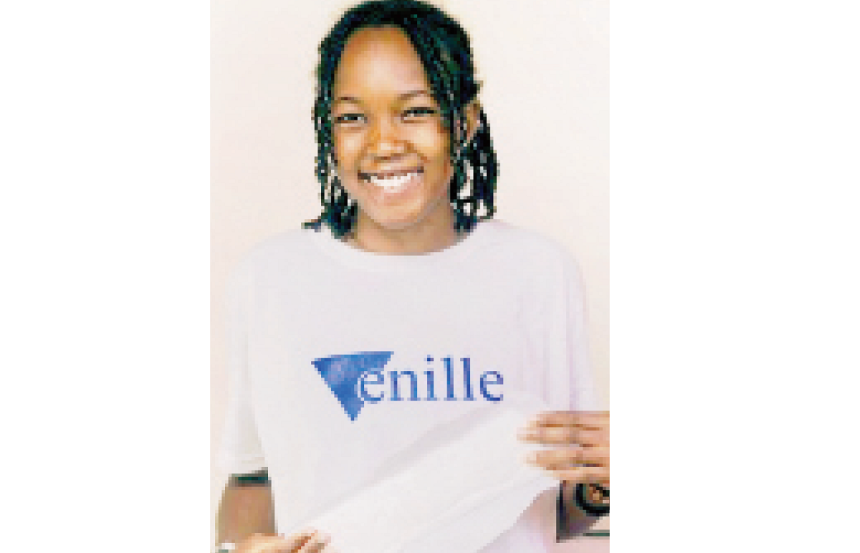During the just concluded Anzisha Entrepreneurship Education in Africa (EEA) Summit, Bunmi Esther Olalude, a young Nigerian entrepreneur, was recognised with the prestigious Job Creation Award for her outstanding work in creating employment opportunities, particularly for women and young people (Venille). Olalude’s success serves as a powerful testament to the potential of Africa’s youth to innovate and create lasting change. ROTIMI IGE presents excerpts from a recent conversation where she explained her passion for solving challenges posed to women and girls in low-income communities.
You’ve just won the Anzisha Job Creation Award. What does this recognition mean for you personally and for Venille’s mission?
Winning the Anzisha Job Creation Award is an incredible honour and a powerful affirmation and revalidation of the work we have been doing at Venille. Personally, it reminds me that the dreams I had as a teenager to make a real impact were valid. For Venille, this recognition is a signal to keep going, it strengthens our mission to fight period poverty, protect the planet, and create dignified jobs, particularly for young women.
Many people still don’t fully understand the scale of period poverty in Nigeria. From your work in the field, what are some of the biggest challenges women and girls in low-income communities face?
Period poverty goes far beyond the lack of pads, it is about shame, stigmatisation, misinformation, and exclusion. Girls often miss school during their periods or use unsafe materials like rags and tissue because they cannot afford better options. In some communities, menstruation is still seen as a taboo topic, and girls suffer in silence without proper knowledge or support, and this only leads to further marginalisation of girls and women in the community.
Your pads are made from upcycled banana stem fibre. How did you land on this innovation, and why was sustainability such a priority for you?
We wanted a product that was safe for both the body and the planet. Through all our research, banana stem fibre caught our attention because it is natural, absorbent, locally abundant, and biodegradable. In Nigeria, banana stems are often treated as waste, so we turned that waste into value. Sustainability was never just a buzzword for us, it is at the very core of menstrual equity and climate action.
One of Venille’s strengths is affordability. How have you managed to keep costs low while still maintaining quality and reaching underserved communities?
We produce our pads in-house and use locally sourced materials like banana fibre, which reduces manufacturing and logistics costs. We also work closely with community organisations, schools, and NGOs to distribute pads in bulk, cutting down costs and reaching more girls at once. Our goal is to never compromise on quality, even while keeping prices accessible.
The Anzisha Prize came with a $10,000 award. What areas of your work will this help you expand or improve?
The prize money will go into expanding our production capacity, hiring and training more women, and scaling Venille AI, our digital health platform that provides menstrual and reproductive health education. It’s not just funding, it’s a launch pad into deeper impact.
We’ve heard touching testimonials from women and girls who use Venille products. Can you share a story that really stayed with you and reminded you why you started?
One story that has always stayed with me is from a young girl in a school in Pankshin in Plateau State. After receiving our pads and participating in one of our menstrual health education sessions, she approached me privately to thank me. She shared that before Venille, she would miss 3 to 5 days of school every month because her family couldn’t afford pads. She often used pieces of cloth or even feathers, which made her feel ashamed and unsafe. Since getting access to Venille Pads and learning more about her body through us, she told me she hasn’t missed a single day of school. That moment reminded me why I started, to ensure that no girl should have to choose between living a full life, and her period.
From your perspective, what specific actions can the Nigerian government and policymakers take to address menstrual health and support businesses like yours?
The government needs to treat menstrual health as a public health and education priority. This means including menstrual hygiene products in national health insurance schemes, removing taxes on sanitary products, and integrating menstrual health education into school curricula nationwide. It’s also essential that the government supports local manufacturers like us through grants, subsidized machinery, and procurement programs that distribute locally made pads to schools and rural clinics. Finally, public-private partnerships are key. When the government collaborates with grassroots innovators, we can scale impact faster and more sustainably.
Entrepreneurship at 23 is no small feat. What have been some of your biggest personal challenges as a young female founder, and how have you overcome them?
One of the biggest challenges has been being taken seriously, especially by investors and older stakeholders. Being young, and a woman, often means having to constantly prove that you’re not just passionate, but also capable. There have also been times when I’ve faced doubt, burnout, and the pressure of trying to solve a big problem with limited time and resources. But I have learned to lean on my team, mentors, and communities like Anzisha for support. Every time I see the real-world impact of our work, it reminds me that my age is not a limitation, it’s an inspiration and part of the innovation I bring.
The Anzisha Summit focused heavily on youth-led solutions. How important do you think it is for more young people to be part of solving Africa’s pressing problems?
I think it is absolutely crucial and very important. Young people bring fresh ideas, energy, and a deep understanding of the current realities, especially because we are often the most affected by these challenges. Whether it’s climate change, period poverty, or youth unemployment, these are not future problems, they are present ones. Youth-led solutions tend to be more agile, flexible, community-rooted, and tech-savvy. Supporting young entrepreneurs is not just about inclusion, it is about deeper impact.
ALSO READ: FG hikes passport fees by 100%
Looking ahead, what’s your vision for Venille in the next five years, and how far do you hope this movement can reach beyond Nigeria?
In the next five years, I see Venille becoming a leading brand in menstrual health innovation across Africa. We plan to expand manufacturing capacity to serve millions, deepen our presence in underserved communities, and roll out Venille AI in multiple African languages. We hope to build partnerships across borders, particularly in West Africa, where access gaps are similar. Ultimately, I want Venille to be more than just a product or platform, I want it to be a movement that empowers girls, protects the planet, and changes the way the world approaches menstrual health.
What is the most heartbreaking story you have heard a girl-child narrate about period poverty?
One girl told us she had to dry and reuse a single rag as a pad for several months because she couldn’t afford a new one. It broke my heart. She was afraid of staining her uniform and being laughed at in class, so she often skipped school. No child should have to suffer such indignity or put their health at risk just because they menstruate. Stories like hers remind me of the urgency of our work.
Do you believe it’s important or necessary to sensitise the boy-child about women’s menstrual health as well?
Absolutely. Ending period shame and stigma requires everyone to be part of the conversation. Educating boys about menstruation helps normalise it and builds empathy. It also ensures they grow up to become supportive partners, brothers, and leaders who advocate for menstrual equity. We can’t achieve true progress by only speaking to half the population.
What was your dream as a secondary school student?
I always wanted to do something meaningful, something that would help people and help the planet. At first, I thought I would become a doctor because I wanted to improve people’s health. But over time, I realized that entrepreneurship, especially in the menstrual health space, could be just as powerful in saving lives, restoring dignity and building sustainable solutions. Venille is a dream that evolved from that desire to make a difference.
Tell us about yourself, the course you studied in university, and how life brought you full circle to what you are doing now.
My full names are Esther Oluwabunmi Olalude. I’m from Ogbomosho South LGA in Oyo State, Nigeria, and I studied Geology at University of Jos in Jos, Nigeria where I live and operate my business. I have always been a lover of the Earth and while my academic background focused on earth sciences, it also gave me a strong appreciation for sustainability, resource management, and the human impact on the environment. Along the way, I became deeply passionate about menstrual health, especially after seeing how access and stigma were affecting girls and women in my community through volunteer work. That passion eventually led me to found Venille, a social enterprise that combines sustainability with health innovation to solve period poverty. So even though I didn’t follow the traditional path of a geologist, my journey brought me full circle to building something grounded in care for both people and the planet.
WATCH TOP VIDEOS FROM NIGERIAN TRIBUNE TV
- Let’s Talk About SELF-AWARENESS
- Is Your Confidence Mistaken for Pride? Let’s talk about it
- Is Etiquette About Perfection…Or Just Not Being Rude?
- Top Psychologist Reveal 3 Signs You’re Struggling With Imposter Syndrome
- Do You Pick Up Work-Related Calls at Midnight or Never? Let’s Talk About Boundaries







